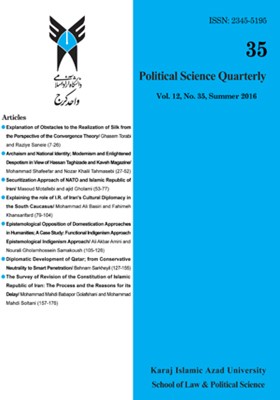Epistemological Opposition of Domestication Approaches in Humanities; A Case Study: Functional Indigenism Approach Epistemological Indigenism Approach
Subject Areas :Nurali Gholamhoseinnia samakosh 1 , Ali Akbar Amini 2
1 - Ph.D. Student of Political Science Dep., Central Tehran Branch, Islamic Azad University, Iran, Tehran
2 - Assistant Prof. of Political Science Dep., Central Tehran Branch, Islamic Azad University, Iran, Tehran
Keywords: Epistemological Opposition, Domestication Approaches in Humanities, Functional Indigenous Approach, Epistemological Indigenous Approach,
Abstract :
Development process has some prerequisites in which the theoretical bases constantly play a significant and considerable role. However, this point is not clearly before us. The science itself needs to be developed. Therefore, the developing countries are confronted with a cycle of development and science; and science development is one the solutions for the above-mentioned problem. Nevertheless, this involves numerous epistemological approaches. There are two main epistemological streams “functional indigenism” and “epistemological indigenism” in the discussions related to Humanities development. These two streams have always had approach opposition which has led to development reduction in Humanities. In this paper, it is aimed to address this question using a qualitative method and applying qualitative data collection tools. The main research question is how the opposition of functional indigenism approach and epistemological indigenism approach in domestication and development of Humanities can make this area efficient or inefficient. The main hypothesis in this paper articulates that the opposition of functional indigenism approach and epistemological indigenism approach slows the development process of Humanities and impedes operationalizing domestication in Iran and the solution is moving toward taking the integrative-synthetic approach in this area.
منابع فارسی
- آزاد ارمکی، تقی (1385)، روشنفکری در گذر اندیشهها، تهران: نشر پژوهشگاه فرهنگ و معارف.
- آزاد ارمکی، تقی (1389)، درآمدی بر نظریهسازی در جامعهشناسی، تهران: نشر کلمه.
- توسلی، غلامعباس (1386) نظریههای جامعهشناسی، تهران: انتشارت سمت.
- توکل، محمد (1389)، «جامعهشناسی معرفت و فرهنگ: تنوع یا تغییر نگرش از کلاسیک به جدید»، نامه علوم اجتماعی، شمارة 33، بهار، صص 22ـ1.
- خورسندی، علی (1388)، علوم انسانی و ماهیت تمدنسازی آن، تهران: پژوهشکده مطالعات فرهنگی.
- داوری، رضا (137۷)، فرهنگ، فرد و آزادی، تهران: انتشارات ساقی.
- داوری، رضا (1386)، فلسفه در دام ایدئولوژی: ویراست فلسفه در بحران، تهران: انتشارات روابط بینالملل.
- رفیعپور، فرامرز (1390)، موانع رشد علمی در ایران و راه حلهای آن، تهران: شرکت سهامی انتشار.
- قانعیراد، محمد امین (1379)، «فردگرایی ایرانی و توسعه نیافتگی»، اطلاعات سیاسی- اقتصادی، شمارههای 152-151، فروردین و اردیبهشت.
- قانعیراد، محمدامین (1387)، «نظریه های دانش و ویژگیهای ساختاری اقتصاد ایران»، فصلنامه سیاست علم و فناوری، سال اول، شماره 4
- قانعیراد، محمدامین (1389)، «گفتگوهای پیش الگویی در جامعهشناسی ایران»، مجله جامعهشناسی ایران، شماره 17
- قانعیراد، محمدامین (1385)، «وضعیت اجتماع علمی در رشته علوم اجتماعی»، نامه علوم اجتماعی، شماره 27.
- مککارتی، ای.دی. (1388)، معرفت به مثابه فرهنگ: جامعهشناسی معرفت جدید، ترجمه محمد توکل و گروه مترجمان، تهران: پژوهشکده مطالعات فرهنگی و اجتماعی.
- موسوی، میرحسین (1389)، «چشمانداز تحقیقات علوم اجتماعی در گذشته»، مجله مدرس علوم انسانی، دوره اول، شماره 8، تابستان.
- مولکی، مایکلجوزف (1389)، علم و جامعهشناسی معرفت، ترجمه حسین کچویان، تهران: نشر نی.
- مومنی، فرشاد (1389)، «ایران و چالشهای مواجهه با علم بومی و علم جهانی»، در: مجموعه مقالات علم بومی و علم جهانی، تهران: انجمن جامعهشناسی ایران.
- نراقی، احسان (1382)، اقبال ناممکن، تهران: انتشارات علم.
_||_


